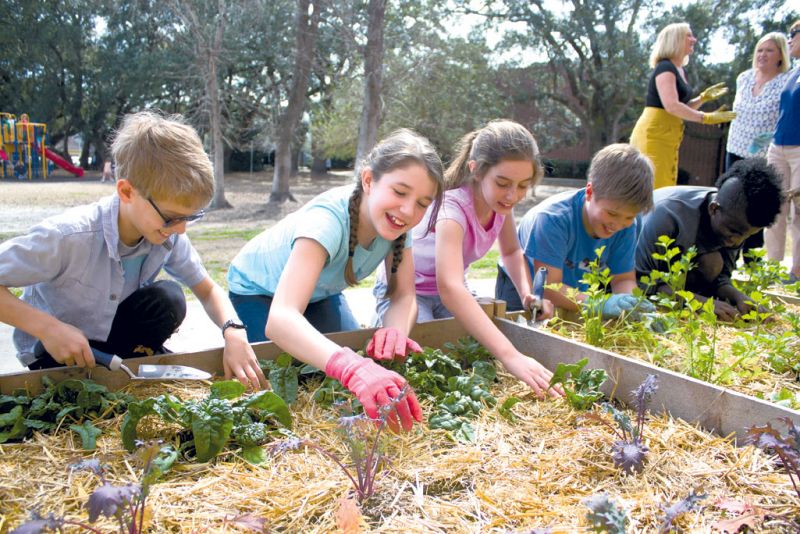
It isn’t hard to recognize the need for a dramatic shift in the course of childhood nutrition. In 2012, the state Department of Health and Environmental Control (DHEC) dubbed 35 percent of youth aged two to 17 years either overweight or obese. But how do you sow those seeds of change? For the past four years, armed with a Boeing-funded grant, College of Charleston (CofC) public health professor Dr. Olivia Thompson has cultivated the Farm-to-School Initiative to generate excitement for locally grown foods. Rather than work from the ground up, the project capitalizes on the efforts of well-established organizations, including South Carolina’s Department of Agriculture.
“We have to consider supply and demand in the cafeteria,” says Thompson of her five-pronged approach to this nutrition mission. First step: infrastructure growth. “There isn’t enough produce in South Carolina to meet dietary needs,” stresses Thompson, noting that the state exports about 90 percent of its crops—most of which is used for animal feed. So the Initiative helps fund Lowcountry Local First’s Growing New Farmers Program and assisted in establishing a certificate program in sustainable agriculture for its graduates through CofC. Good Agriculture Practices (GAP) certification events are also funded to foster novice farmers who can supply schools with fresh produce.
Secondly, the crops must be processed before schools can use them—which can be expensive. In partnership with Clemson Extension and Clemson School of Architecture, the initiative developed two commercial farm kitchens for growers serving schools. At these Crop Stops, situated on John’s Island and in Greenville, farmers reap the benefits of a professional kitchen at about 15 percent of the typical commercial cost.
Once crops become available, the next steps involve bringing harvest to plate. A Culinary Institute of Charleston partnership established a week-long course teaching school food service staff about fresh produce preparation and created a cookbook offering a four-week lunch menu. To reach students at home, the Farm-to-School Initiative supports the national nutritional education program Cooking Matters, which is administered to parents and guardians through the Lowcountry Food Bank, DHEC, and Clemson Extension. The course includes cooking classes for families, guidance on shopping for budget-friendly healthy fare, and more.
The final step uses school gardens to encourage kids to eat their veggies. “Children who grow crops are more likely to consume them,” explains Thompson, who tapped Clemson Extension to provide online classes and resources (including a year’s worth of assistance from Clemson Extension Master Gardeners) for educators looking to install gardens. At the request of participating teachers, the Farm-to-School Initiative also created an outdoor garden textbook that focuses on state STEM (science, technology, engineering, and mathematics) standards with a nutritional supplement. “Scores have shot up in classes that utilize their outdoor gardens for as little as two hours a week,” explains Thompson.
While the Farm-to-School Initiative is rooted in improving childhood nourishment, the benefits in academics have proven just as fruitful. And with the multi-agency hybrid having expanded into a statewide venture last fall, South Carolina can look forward to an abundance of healthy school nutrition programs.
The farm-to-school initiative has:
Allocated funding for 131 beginning farmers to participate in Lowcountry Local First’s Growing New Farmers Program.
Covered the cost for 17 local farmers to complete a two-day Good Agriculture Practices (GAP) course.
Trained 157 food service managers and staff members from Title 1 and Title 1-equivalent schools.
Provided classroom garden training to 235 educators and installed school gardens in 90 Title 1 and Title 1-equivalent schools.
Paid for 117 parents and guardians to participate in the six-week Cooking Matters course.